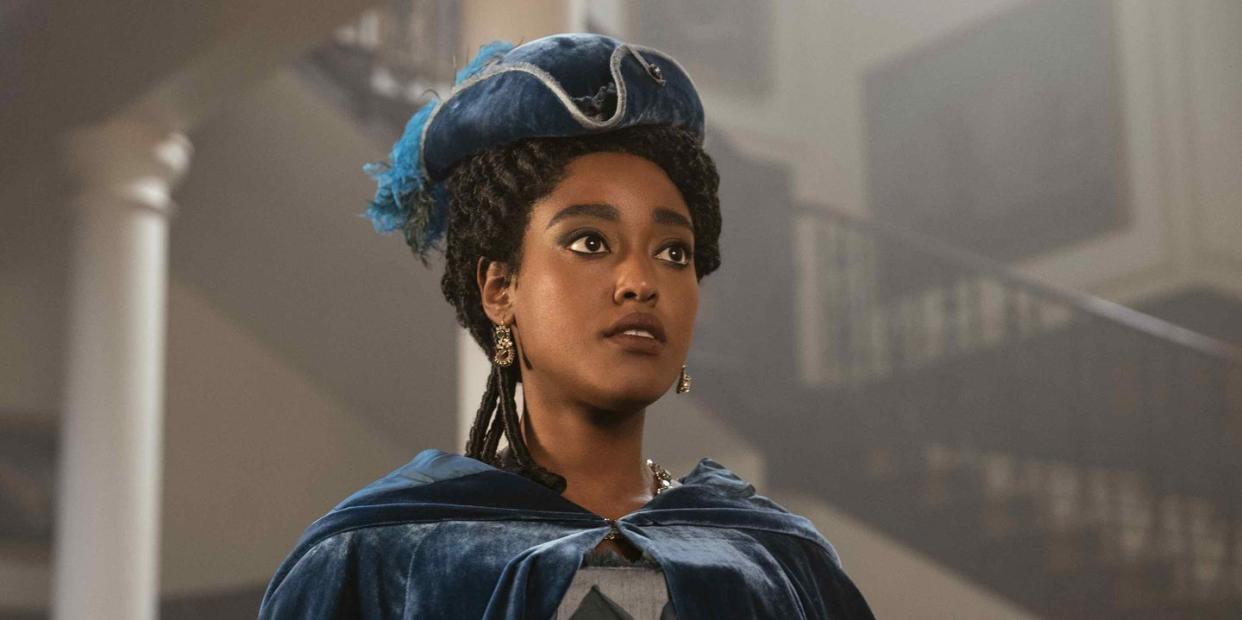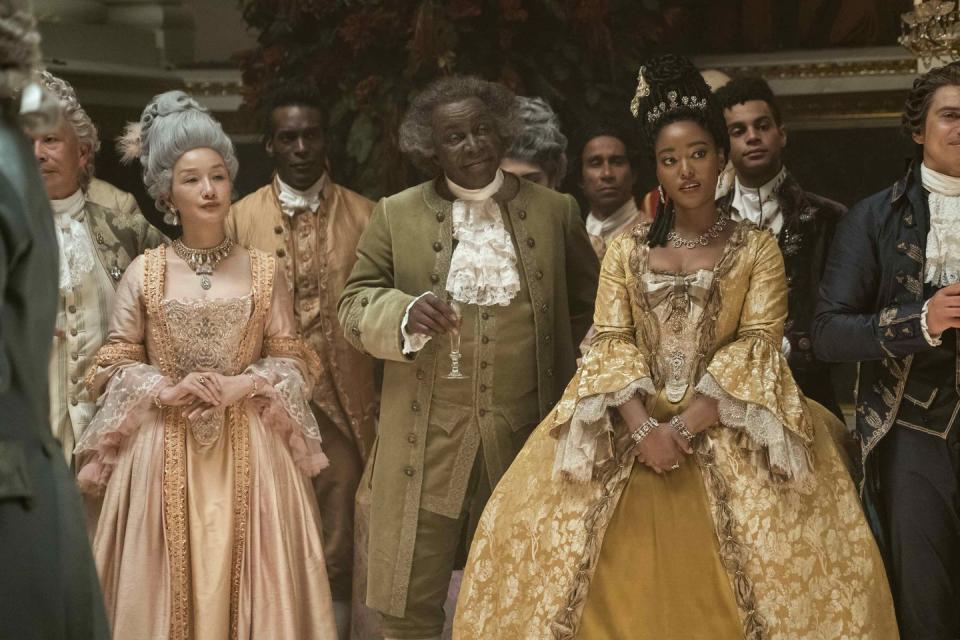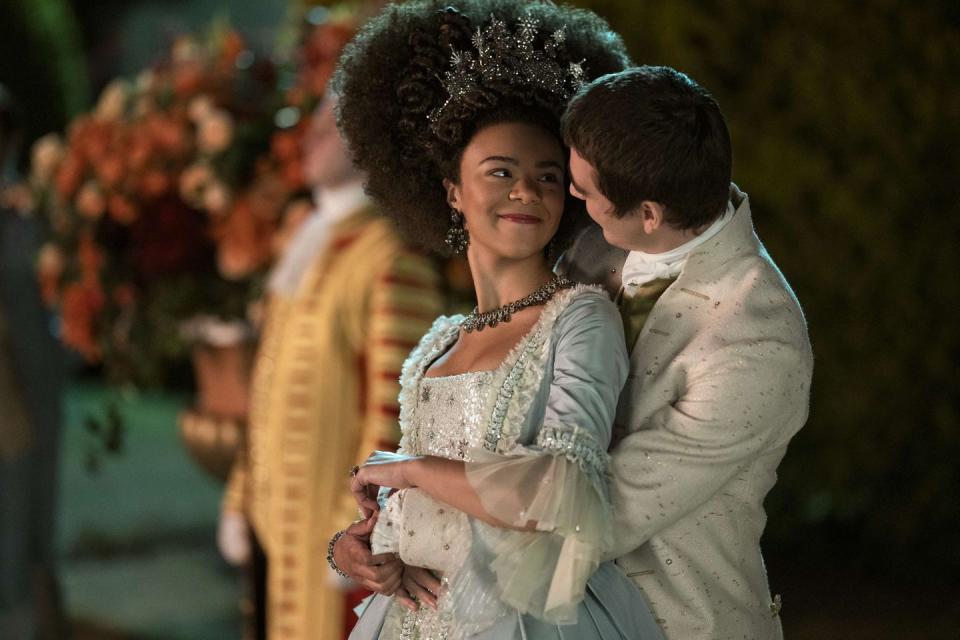'The 'Bridgerton' Universe Has A Marital Rape Problem—Here's Why It Has To Stop'

Content warning: Discussion of marital rape and sexual assault.
Netflix’s Bridgerton and its newest prequel, Queen Charlotte: A Bridgerton Story, are marketed as escapist romance, but the fake-Regency-era universe consistently subjects its Black characters to instances of marital rape that are played off as comedic interludes or a little bump in the road for a happily married couple. It’s not. And personally, I’m fed up.
It’s bizarre to me that Bridgeton has doubled -down on such repeated, graphic scenes of sexual assault after being called out for this issue before. In Bridgerton, Season 1, Black viewers were outraged after Daphne Bridgerton (Phoebe Dynevor) rapes her husband, Simon, the Duke of Hastings (Regé-Jean Page), forcing him to ejaculate inside of her so she’d get pregnant, even though he didn’t want to be a father. In fact, the central plot of Season 1 revolves around Daphne’s manic quest for Simon’s sperm, which not only turns violent, but stomach-curdlingly gross.
Instead of changing course, it happened again in Queen Charlotte, a spinoff that delves into the young royal’s love life. Viewers watch as young Lady Danbury (played by Arsema Thomas) is continually raped by her much older husband, often several times an episode. When I tweeted about the abhorrent marital rape in the show shortly after its premiere, people told me I was exaggerating, arguing this was merely a wife having “bad sex” with her husband in olden times.
But it wasn’t just bad sex—Lady Danbury is groomed to be this man’s wife from age three, seems to dissociate during sex, and when she wants to abstain, it seems to come with consequences. There’s even one scene where he threatens to make her have sex with him if she doesn’t do what he asks, and viewers see the fear and sadness in her eyes before acquiescing.
Shonda Rhimes listening to all of us get upset about a Black man getting raped in Season 1 and then making us watch a Black woman get raped in almost every single episode, multiple times an episode sometimes, in Queen Charlotte… that is my villain origin story
— nylah (@yumcoconutmilk) May 4, 2023
And for Black viewers like me, the show’s refusal to engage with these scenes of marital sexual violence has become a disturbing pattern. “A lot of people aren’t realizing that Lady Danbury has no room to consent in these scenes,” Sydney Thomas, associate editor at Off Colour Magazine, tells Women’s Health. “She’s never asked if she also wants to have sex. She’s not even really an active participant. It’s concerning to me that a lot of people seem to not be reading it as rape.”

Queen Charlotte chooses to portray this violence against Lady Danbury as just another unpleasant, wifely duty.
Despite Lady Danbury’s obvious disgust during these encounters—she literally has her maid draw a scalding bath after each one—the assaults are treated as a humorous bit. Her physical pain is minimized (a moment where she speaks of needing a salve for her thighs passes without comment) and she often has a dissociative look on her face while being slammed against her wooden headboard. Queen Charlotte (India Amarteifio) even makes a joke about this horrifying sequence when she first has sex with her husband King George III (Corey Mylchreest).

George asks Charlotte what she knows about the “marital act,” and she responds, “I do not like the part where my head slams against the headboard. Is there a way to avoid that?” She is, of course, referencing the descriptions Lady Danbury gave of her own sexual experiences. George chuckles lightly and they proceed to have steamy, romantic, consensual sex—and never express any concern for Lady Danbury.
The conflation of marital rape with unenjoyable (or just plain boring sex) normalizes something that should be called out.
And it is a choice the Bridgerton franchise does, seemingly without a second thought. The show likes to lean into its “escapist” genre to dodge criticisms of white-washing and inaccurate portrayals of racism and slavery, but then shows gratuitous sexual violence instead of sexy romance.
To market the show to Black women as quality representation, and then depict Black characters’ sexual assaults in graphic detail, feels reckless, bleak, and purposeful. Instead of losing themselves in the show, Black women are actively traumatized.
“I was so shocked and disgusted that I started looking away after the second time it happened on screen,” writer Imani Sumbi, says of the marital rape scenes. “It was infuriating. It was disheartening.”
Despite being a Black woman and a survivor of sexual violence, I am rarely triggered by on-screen depictions of racism and assault (even though people assume I am when I call out these horrible portrayals). Queen Charlotte was no different. But I still think it’s important to call out these problematic depictions. We don’t have to be distressed by something to know that it is wrong. We should all speak up whether it was triggering or not.
Marital rape is one of the most aggressively normalized forms of sexual assault, so the Bridgerton universe’s choice to participate in that normalization perpetuates a centuries-old problem.
In Britain, marital rape was legal until 1991 (yes, you read that right). The 17th Century Hale Rule set the precedent that a man having sex with his wife could never be considered rape, because marriage made them “one flesh,” making non-consent impossible. According to PBS, in 1888, an English judge wrote, “The intercourse which takes place between husband and wife after marriage is not by virtue of any special consent on her part but is mere submission to an obligation imposed on her by law.” These centuries-old laws aren’t relics. We’re still fighting their premise today.
Prior to the 1970s, marital rape was also explicitly legal in the United States. Even now, there are some states that have yet to remove loopholes that make it prosecutable.
Approximately 10 to 14 percent of married women in the US are raped by their husbands during their marriage, and roughly one in three women report having 'unwanted sex' with their partner, according to the National Resource Center for Domestic Violence. And experts suggest these numbers are likely vastly underreported.
This isn't first show to use marital rape against Black characters as a storytelling device.
And it’s endlessly frustrating to me. In the wildly popular TV series The Handmaid’s Tale, June, a white woman and survivor of severe sexual violence, rapes her Black husband, Luke, as he begs her to stop. The camera focuses on her face and her enjoyment, portraying it as a dark moment of female empowerment, instead of a violation.
Scenes like this make it harder for Black people to be believed about marital rape, says Sumbi. “I imagine that this, compounded by stereotypes of Black male strength/violence and Black female resilience make it especially difficult for Black people to come forward with stories of marital rape, particularly in a country that used Black bodies as vehicles for birthing and laboring without consent since its inception,” she explains, pointing out that Bridgerton’s Duke Simon is essentially raped for reproductive purposes.
Even though women are at the greatest risk for marital rape, men—and especially men of color—can be victims as well.
Marriage does not grant spouses total control over each other’s bodies, and showrunners need to make that explicit.
It’s disappointing that Queen Charlotte blurs the lines between unfulfilling sex and non-consensual sex within a marriage, and it’s especially concerning that it singles Black characters out. It’s not a joke. It’s not a bit. If the show wanted to send the message that Lady Danbury was in a loveless marriage, they could have done so without the sexual violence.
“Writers and directors need to think carefully about how they’re framing intimacy and power dynamics, and how they are encouraging audiences to view characters’ bodies,” Sumbi says. “If you’re going to explore sexual assault as a theme, you must lend it the weight and seriousness it deserves. To confuse sexual abuse with bad sex is not just idiotic. It’s plain dangerous.”
All that time wasted watching Lady Danbury get assaulted might have been spent getting swept up in the types of deep, passionate love scenes Bridgerton promises. Or, perhaps, Lady Danbury could have been given her own love story.
You Might Also Like


